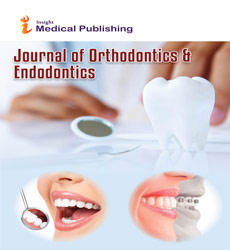The Relation between Tooth Loss and Cognitive Functions
Hesham Hasif
Department of Orthodontic and Pediatric Dentistry, Qassim University, Buraydah, Saudi Arabia
Published Date: 2023-08-14DOI10.36648/2348-1927.9.4.83
Hesham Hasif*
Department of Orthodontic and Pediatric Dentistry, Qassim University, Buraydah, Saudi Arabia
- *Corresponding Author:
- Hesham Hasif
Department of Orthodontic and Pediatric Dentistry,
Qassim University, Buraydah,
Saudi Arabia,
Email: hhsif@gmail.com
Received date: July 13, 2023, Manuscript No. IPJOE-23-17831; Editor assigned date: July 17, 2023, PreQC No. IPJOE-23-17831 (PQ); Reviewed date: July 31, 2023, QC No. IPJOE-23-17831; Revised date: August 07, 2023, Manuscript No. IPJOE-23-17831 (R); Published date: August 14, 2023, DOI: 10.36648/2348-1927.9.4.83
Citation: Hasif H (2023) The Relation between Tooth Loss and Cognitive Functions. J Orthod Endod Vol.9 No.4:83.
Description
Tooth loss and its effect on mental impedance have turned into a warmed subject throughout the last 10 years as the worldwide populace keeps on maturing. In spite of the expansion of exploration around here, the basic system connecting tooth misfortune and mental deterioration remains inadequately comprehended. Restricted examination has been directed to investigate the possible job of lipid digestion and its effect on the relationship between tooth misfortune and mental capability. This study attempted to recognize the job of highthickness lipoprotein cholesterol fixation among more established grown-ups and its commitment to the connection between tooth misfortune and mental hindrance. Information were recovered from a public data set, specifically, the public wellbeing and sustenance assessment review. Among 1,124 included members who were matured over 60 years of age, straight relapse was performed to decide the relationship between tooth misfortune (moderate and extreme tooth misfortune) and mental capability. Intervention investigation was utilized to test the impact of HDL-C on the relationship of tooth numbers and four mental tests. Dementia has been distinguished as one of the most squeezing general wellbeing concerns. It is assessed that the worldwide number of passings because of dementia will flood from 57.4 million out of 2019 to 152.8 million of every 2050. The administration of promotion, alongside the related costs of supporting promotion patients distressed with this condition, presents a huge monetary strain for people and their families, as well as the medical care framework.
Dementia
Despite the extensive number of examinations that have been led on promotion, the genuine pathophysiology of this sickness stays an area of continuous examination. Amyloid-beta (Aβ) and tau protein have been generally acknowledged to be related with the beginning and movement of promotion. A few scientists recommended that cholesterol fixation could assume a significant part in the fountain of Aβ, which would build the gamble of growing promotion. Existing information show that hypercholesterolemia in rodents sped up the gathering of Aβ, while decreasing the serum cholesterol levels through statins improved the total of Aβ in human serum. A new populace investigation has discovered that keeping up with suitable cholesterol levels can possibly forestall mental debilitation, as people with moderate cholesterol levels show better mental working. Furthermore, high-thickness lipoprotein cholesterol has been recognized as valuably affecting mental capability. An observational review detailed that low degrees of blood HDL-C were connected to mental weakness and clinically analysed dementia in people matured 85 and over. By and by, this diverged from a review led in Japan that proposed higher HDL-C levels were related with lower mental capability in people matured somewhere in the range of 40 and 59 years. The specific job of HDL-C levels in the mental capability stays muddled. Tooth, as the essential unit in the stomatognathic framework, serves a vital job in personal satisfaction past rumination. Tooth misfortune can result in diminished masticatory capability that could prompt ailing health, and effect discourse capacities and confidence, which could block social contribution of the person. Somewhat recently, tooth misfortune has turned into a critical worldwide worry because of its arising suggestions as a gamble factor for mental degradation. Strikingly, cholesterol levels have been viewed as related with tooth misfortune. Creature research has recommended that elevated degrees of blood cholesterol are related with expanded alveolar bone misfortune, which could at last prompt tooth misfortune. Another populace based concentrate on directed in Korea has uncovered that tooth misfortune brought about lower high-thickness cholesterol levels and higher fatty oil levels among more established ladies. Considering that some examination has shown that cholesterol levels could influence mental capability, there could exist a connection between cholesterol levels, tooth misfortune and mental capability.
Conclusion
Subsequently, the point of this study is to recognize the job of cholesterol levels and their effect on the relationship between tooth misfortune and mental debilitation. This study planned to research the potential intervening job of cholesterol levels in the connection between tooth misfortune and mental capability among the older populace in the US, using public information from NHANES (2011-2014). The discoveries have shown that members with moderate tooth misfortune (1-19 leftover teeth) and extreme tooth misfortune (0 excess teeth) were related with more unfortunate memory, verbal familiarity, and leader speed. This study recommends that tooth misfortune is antagonistically corresponded with mental capability. HDL-C levels go about as a middle person in the connection between tooth misfortune and working memory and engine/handling pace and complex consideration. These outcomes can have significant ramifications for supporting the anticipation and restoration of tooth misfortune, observing HDL-C levels, and giving early intercessions to forestall mental deterioration.
Open Access Journals
- Aquaculture & Veterinary Science
- Chemistry & Chemical Sciences
- Clinical Sciences
- Engineering
- General Science
- Genetics & Molecular Biology
- Health Care & Nursing
- Immunology & Microbiology
- Materials Science
- Mathematics & Physics
- Medical Sciences
- Neurology & Psychiatry
- Oncology & Cancer Science
- Pharmaceutical Sciences
